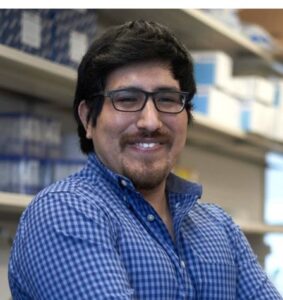
I recently joined the Department of Microbiology, Immunology, and Cancer Biology and the Beirne B. Carter Immunology Center at the University of Virginia School of Medicine as an Assistant Professor. I obtained my PhD working in gut microbiota and systemic lupus erythematosus, under the supervision of Dr. Martin Kriegel at Yale University. My current research applies the techniques I learned in my postdoc and graduate school to assess the role of gut microbes in the thymic development of microbiota-specific T cells and how these T cells can modulate disease in autoimmunity. To elucidate this process, I use a tetramer-based approach to identify and track antigen-specific T cell expansion in the thymus before they distribute and differentiate in the periphery. I use these and other techniques I learned during my postdoc in the laboratory of Dr. Gretchen Diehl in the Immunology Program at Memorial Sloan-Kettering Cancer Center.
My proposed research and mentoring plan have provided me the required foundation to transition into an independent researcher with a long-term career goal to understand how microbiota-specific T cell responses arise and define how they exacerbate lupus pathogenesis. During the K99 phase, together with my mentoring team, I developed a career plan that 1) increased my technical skills, 2) refined my scientific scope, 3) improved my communication skills, and 4) expanded my scientific network. During the R00 phase, I will employ the techniques and experimental approaches I have learned during the K99 phase, as well as take advantage of the network I have built as a postdoc/graduate student and start building collaborations with members of the Beirne B. Carter Immunology Center and the Department of Microbiology, Immunology, and Cancer Biology.
RESEARCH: Lupus development is associated with intestinal dysbiosis in patients and mouse models. Dysbiosis in lupus is characterized by pathobiont overgrowth and is linked to dysregulated immune responses that exacerbate pathogenesis. In my graduate work, I found increased pathobionts including Lactobacillus reuteri in mouse lupus models and subsets of SLE patients. I showed L. reuteri translocated systemically, leading to increased inflammatory pathways and proinflammatory T cells which exacerbated systemic inflammation and worsened lupus pathogenesis. In my postdoctoral work, I investigated how differentiation of microbiota-specific T cells is regulated during development and its effects in inflammatory processes. While we and others find peripheral expansion of microbiota-specific T cells with effector function in adult mice, in young mice we surprisingly found microbiota-specific T cells first expanded in the thymus, a site not previously known to allow for antigen-specific T cell expansion. I aim to synergize the knowledge generated during my graduate and postdoctoral training to determine if thymic development of L. reuteri-specific T cells is amplified in lupus susceptible hosts and to assess their role in lupus exacerbation. I will develop this proposal by 1) Determining how thymic microbiota-specific T cells modulate lupus pathogenesis and 2) Defining how lupus pathobionts modulate pathobiont-specific T cells expansion.
ENVIRONMENT: My laboratory is in the Beirne B. Carter Immunology Center at the University of Virginia, where I work closely with my faculty mentor Dr. Victor H. Engelhard. In addition to being part of an active immunology community in the Department of Microbiology, Immunology, and Cancer Biology and the School of Medicine at , I will work closely with my faculty mentor Dr. Victor H. Engelhard and other researchers across grounds.
